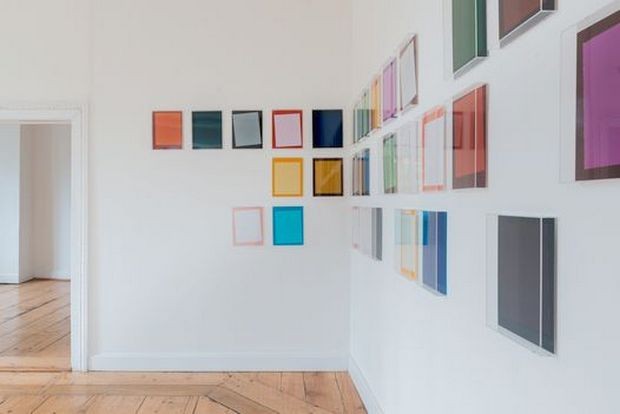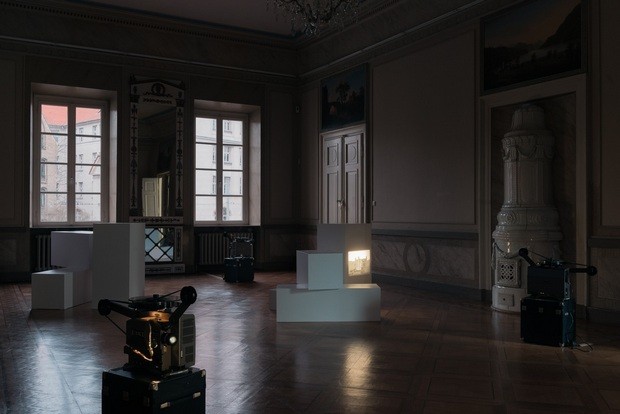Ebbe Stub Wittrup
Figures of Perception
12 Mar - 22 May 2016

Ebbe Stub Wittrup, After Matyushin’s Guide to Colour, 2014 installation view Kunstverein Braunschweig, 2016, courtesy the artist and Martin Asbæk Gallery, photo: Stefan Stark

Ebbe Stub Wittrup, Mary Rose – A Play in Three Acts, 2011, installation view Kunstverein Braunschweig, 2016, courtesy the artist and Martin Asbæk Gallery, photo: Stefan Stark
EBBE STUB WITTRUP
Figures of Perception
12 March 2016 - 22 May 2016
Curated by: Jule Hillgärtner / Curatorial assistance: Aline Fieker
Ebbe Stub Wittrup engages in studies in perception and brings attention to how reality is seen and how it is taught to be seen. There is no doubt that perception takes place not only by means of the retina of the eye, but that it is also a complex and dynamic process, which is influenced by individual, social, historical and cultural patterns of perception. To achieve this, Wittrup uses and intertwines phenomena of perceptual psychology, mythological narratives, or history of art. In his monochrome photographic works for the series After Matyushin’s Guide to Color (2014), he makes reference to the theory of color by the Russian avant-garde painter and composer Mikhail Matyushin. In Wittrups cinematic piece Mary Rose – A Play in Three Acts (2011), the question arises: how can something be put into the picture, which, at the same time, evades that very process. This process can be compared to a mythological narrative that contradicts all rational thought, but which, at the same time, entices us to engage in it over and again.
The artist transforms his research into objects, films, photographs, and installations; he traces the mysteries of perception without, however, ever resolving them. Wittrup thoroughly masters the field of orchestration and transfiguration, while sensation and content are closely interlocked. Real and unreal phenomena float into one another and challenge the spectator to a forced and thorough perception of what they see, read, and hear. To view Ebbe Stub Wittrup’s works means to constantly engage in an active process of perception and reflection. Playing with an optical illusion the video Ropes (2012) suggests an upward movement by itself. In his installation The Indian Rope Trick (2012), Ebbe Stub Wittrup confirms a phenomenon by the same name that supposedly happened in India: A vertically straightened rope enables a person to climb upwards and vanish into nothingness. His artistic strategy of combining the actual visual impression with a myth refuses to give clear answers.
Photography, Wittrup’s base medium, is still present in most of his works. As a supposedly neutral recording-instrument, photography always invites one to question the relationship between reality and image. In this way, the photographs in Perception Figures (2015) entice the spectator to recognize spatial depth on the two-dimensional surface. Time and again the visitor encounters formal and textual connections in the exhibition. Precisely positioned in the floor plan of the Villa Hospes, Ebbe Stub Wittrup plays with symmetries and visual axes of works and rooms. Where formal precision and irrational stories meet, further planes of meaning can be revealed – a third room or an image behind it.
Ebbe Stub Wittrup (*1973 in Aarhus, Denmark) lives and works in Copenhagen. The Aros Aarhus Museum of Modern and Contemporary Art and the Kirchner Museum in Davos showed solo shows of him in 2014 and 2013 respectively. He participated in numerous group exhibitions in Denmark and internationally. He has been teaching as an associated professor at the Jutland Academy of Fine Arts since 2013.
Figures of Perception
12 March 2016 - 22 May 2016
Curated by: Jule Hillgärtner / Curatorial assistance: Aline Fieker
Ebbe Stub Wittrup engages in studies in perception and brings attention to how reality is seen and how it is taught to be seen. There is no doubt that perception takes place not only by means of the retina of the eye, but that it is also a complex and dynamic process, which is influenced by individual, social, historical and cultural patterns of perception. To achieve this, Wittrup uses and intertwines phenomena of perceptual psychology, mythological narratives, or history of art. In his monochrome photographic works for the series After Matyushin’s Guide to Color (2014), he makes reference to the theory of color by the Russian avant-garde painter and composer Mikhail Matyushin. In Wittrups cinematic piece Mary Rose – A Play in Three Acts (2011), the question arises: how can something be put into the picture, which, at the same time, evades that very process. This process can be compared to a mythological narrative that contradicts all rational thought, but which, at the same time, entices us to engage in it over and again.
The artist transforms his research into objects, films, photographs, and installations; he traces the mysteries of perception without, however, ever resolving them. Wittrup thoroughly masters the field of orchestration and transfiguration, while sensation and content are closely interlocked. Real and unreal phenomena float into one another and challenge the spectator to a forced and thorough perception of what they see, read, and hear. To view Ebbe Stub Wittrup’s works means to constantly engage in an active process of perception and reflection. Playing with an optical illusion the video Ropes (2012) suggests an upward movement by itself. In his installation The Indian Rope Trick (2012), Ebbe Stub Wittrup confirms a phenomenon by the same name that supposedly happened in India: A vertically straightened rope enables a person to climb upwards and vanish into nothingness. His artistic strategy of combining the actual visual impression with a myth refuses to give clear answers.
Photography, Wittrup’s base medium, is still present in most of his works. As a supposedly neutral recording-instrument, photography always invites one to question the relationship between reality and image. In this way, the photographs in Perception Figures (2015) entice the spectator to recognize spatial depth on the two-dimensional surface. Time and again the visitor encounters formal and textual connections in the exhibition. Precisely positioned in the floor plan of the Villa Hospes, Ebbe Stub Wittrup plays with symmetries and visual axes of works and rooms. Where formal precision and irrational stories meet, further planes of meaning can be revealed – a third room or an image behind it.
Ebbe Stub Wittrup (*1973 in Aarhus, Denmark) lives and works in Copenhagen. The Aros Aarhus Museum of Modern and Contemporary Art and the Kirchner Museum in Davos showed solo shows of him in 2014 and 2013 respectively. He participated in numerous group exhibitions in Denmark and internationally. He has been teaching as an associated professor at the Jutland Academy of Fine Arts since 2013.
